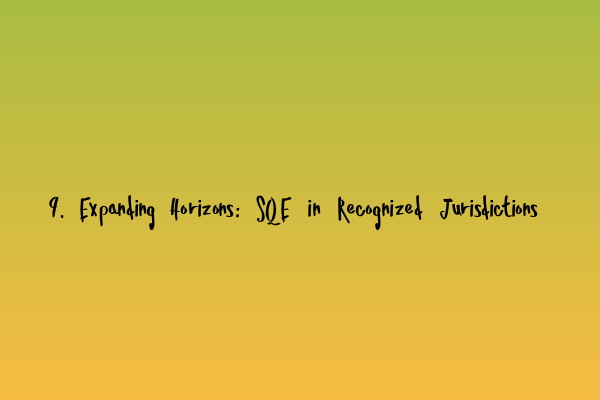Expanding Horizons: SQE in Recognized Jurisdictions
As legal professionals, we are constantly seeking ways to expand our horizons and explore new opportunities. The introduction of the Solicitors Qualifying Examination (SQE) in recognized jurisdictions has opened up a world of possibilities for aspiring solicitors.
The SQE, which replaces the previous system of the Legal Practice Course (LPC) and the Qualified Lawyers Transfer Scheme (QLTS), offers a more streamlined and standardized approach to qualifying as a solicitor. It provides a level playing field for candidates from both domestic and international backgrounds, ensuring that the skills and knowledge required to practice law in England and Wales are universally assessed.
One of the key advantages of the SQE is its recognition in other jurisdictions. This means that individuals who qualify through the SQE can practice law not only in England and Wales but also in other countries that recognize the qualification.
For those looking to expand their international presence and practice law globally, this is an exciting development. It opens up doors to new career opportunities and allows solicitors to work on complex cross-border matters.
However, it is important to note that the recognition of the SQE may vary across jurisdictions. While some countries fully recognize the qualification and allow SQE-qualified solicitors to practice law without any additional requirements, others may have certain conditions or additional examinations that need to be fulfilled.
For example, in the United States, several states allow SQE-qualified solicitors to sit for the state bar examination and practice law within their jurisdiction. However, it is essential for solicitors to research and understand the specific requirements of each jurisdiction they are interested in practicing in.
To maximize the benefits of the SQE qualification in recognized jurisdictions, it is important to prepare thoroughly for the examination. SQE 1, the first stage of the examination, assesses candidates’ functioning legal knowledge through multiple-choice questions and legal research tasks. To excel in this stage, it is recommended to practice with SQE 1 practice exam questions and mock exams.
Once candidates have successfully completed SQE 1, they proceed to SQE 2, the second stage of the examination. SQE 2 tests candidates’ practical legal skills through tasks such as client interviewing, advocacy, and legal research. Proper preparation for SQE 2 is crucial, and there are dedicated SQE 2 preparation courses available to help candidates hone their skills and ensure success.
As with any examination, it is important to stay updated on the latest information and important dates. The SRA SQE exam dates are announced regularly, and it is advisable to plan and schedule your preparation accordingly.
Overall, the SQE in recognized jurisdictions brings unparalleled opportunities for legal professionals to expand their horizons and practice law on a global scale. It provides a standardized qualification that is recognized in various countries, enabling solicitors to pursue international legal careers and take on diverse challenges.
